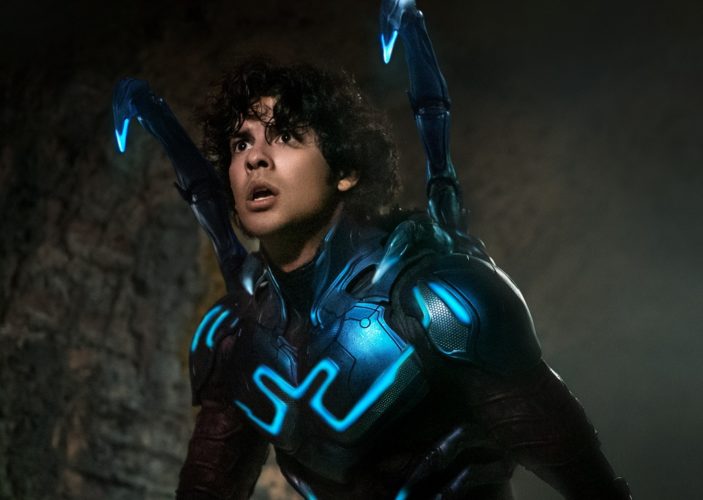
It’s rare these days for the “superhero origin story” to deviate from a familiar path. It’s what is done within and around said path that manages to make even the most tested of narratives somewhat exciting.
Blue Beetle is another case of been there, done that, with its story centring around a symbiote that transforms its host into a super-enhanced being whose abilities come off like a mix of Spider-Man and Iron Man. It also doesn’t help that the film has an air of “made for TV” quality about it, but, in the films defence (I guess???), it was originally designed to be a streaming-only title; Max (formerly HBO Max) had the film on their streaming roster when announced in 2021, but execs enjoyed director Ángel Manuel Soto‘s vision so much that they shifted towards theatrical.
I understand that none of this particularly sounds like a shining endorsement for an actioner that’s following a string of underperforming DC properties (Black Adam, Shazam: Fury of the Gods, and The Flash all coming up bombastically short with audiences) and may not ultimately have much of a future on the roster under James Gunn’s planned overhaul.
So why bother with the Beetle at all?
It’s a valid question for a film that can’t escape its streaming feel (though I applaud its cinematic treatment, as I firmly believe every film should be seen on the big screen, regardless of scale), has a surprising lack of set-pieces (usually a staple ingredient for films of this ilk), and doesn’t quite stick the landing in terms of its villain (the usually reliable Susan Sarandon feeling remarkably deflated throughout).
BUT, in spite of all that, Soto can’t help but win us over with his genuine affection for the character, his 1980’s-action-film-treatment of the material, and a sense of Latino pride in how the film succeeds as one about family first and superhero second; I mean, any film that allows a treasure such as Mexican actress Adriana Barraza – playing the involved family’s Nana – to brandish a shotgun (of sorts) and join in the ludicrous action of the finale deserves some points, right?
Before we get to such a sight though, we need to understand how Blue Beetle came to be, with Xolo Maridueña leading the charge as Jaime Reyes, a recent college graduate, whose post-education intentions are cut right back down to reality when his return to his hometown, Palmera City, brings the realisation of zero job prospects and his family facing eviction due to financial difficulties; this just the first of numerous relatable struggles for the Reyes family.
Managing to pick up work as a housekeeper (one of many) alongside his sister (Belissa Escobedo filling the quippy sibling quota) at an expansive estate run by villain-in-heels Victoria Kord (the aforementioned Sarandon), Jaime’s run-in with Victoria’s niece, Jenny (Bruna Marquezine), brings him into contact with an ancient scarab – a supremely valuable piece of technology that Jenny palms off to him, knowing her war-bent aunt won’t think to even acknowledge someone as low down on the feeding chart as Jaime.
Despite his best intentions to stay true to Jenny’s word of staying out of contact with the scarab, Jaime can’t help but succumb, and soon the scuttering, beetle-like object is fusing itself with his person (it may or may not enter Jaime’s body through his rectum) and transforming him into an armoured weapon, complete with metallic appendages and militaristic capabilities; the sequence where he first merges with the beetle and takes his new “body” out for a test drive is, arguably, the film’s highlight.
As he learns that he can fly, shoot forceful blasts, appear bulletproof, and has a built-in A.I. system that informs him that his mind can physically create anything he imagines – singer Becky G providing said operating voice – he quickly comes up against Victoria and her army of similarly created super-soldiers. From hereon, the remainder of Blue Beetle‘s 127 minutes dwindles into standard action territory, with Gareth Dunnet-Alcocer‘s script failing to make much of a lasting impression.
It’s a real shame, too, as Soto’s direction, Maridueña’s enthusiastic performance, and the film’s overall sense of love for the Reyes familia is what truly makes it all feel so alive; unfortunately, because the back-end of the film is usually what most people leave remembering, the uninspired second half threatens to overrun the peppy step of its first. That being said, the action-heavy mentality of Blue Beetle‘s latter isn’t all amiss, with Soto’s clear love of cheesy 1980’s family action films a major source of inspiration, and if viewed through that lens it proves easier on the intake; plus there’s the aforementioned Nana-wielding-a-weapon moment that truly speaks to both Soto’s affection for genre cheese and strong female personalities.
With Gunn’s overhaul of the DC timeline taking out the major players we have come to expect over the last decade it’s difficult to know just what lies ahead for Blue Beetle and Maridueña’s incarnation of the character. It’s been said that Blue Beetle is the first character in the new line-up, but whether or not Blue Beetle as a film represents that re-start is a little less clear, and ultimately it’s disappointing as Maridueña is so effortlessly charming in the role and Soto shows strength and fervour behind the camera.
A little more lightweight as a DC outing, as opposed to the more “event” aesthetic lent to previous titles, Blue Beetle won’t recharge the timeline, but in taking itself less seriously it provides a sense of levity to a genre so often bogged down in its own self-importance.
![]()
![]()
![]()
![]()
![]()
THREE STARS (OUT OF FIVE)
Blue Beetle is screening in Australian theatres from September 14th, 2023.
